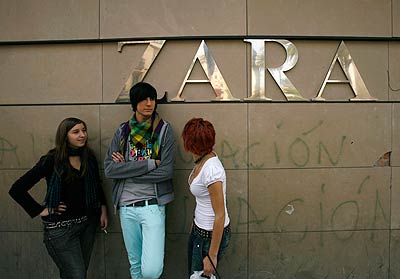(单词翻译:单击)

Once upon a time, fashion was glamorous models and movie stars wearing haute couture on glossy magazine covers. People saved their salaries and shopped once or twice a year for high-quality clothes that could last for many seasons.
曾经,时尚就是登上光洁杂志封面的那些身着高级定制,魅力非凡的模特和影星。人们省下平时的薪水,每年会逛一两次商场,来选购那些耐穿的高级服装。
Nowadays, fashion is fast-changing and cheap thanks to retail brands such as H&M, Zara and Topshop. Fashion has become ever more accessible. But is it a good thing?
现在,由于H&M、Zara 、Topshop等服装品牌的出现,时尚变得日新月异,且价格低廉。时尚变得前所未有的平易近人。而这是件好事吗?
US writer Elizabeth Cline doesn't think so, although she used to be the owner of a wardrobe solely made up of cheap chic.
美国作家伊丽莎白•克莱(音译)却不这样想,虽然她曾经拥有一整衣柜这种便宜又时髦的衣服。
In her recent book Overdressed: The Shockingly High Cost of Cheap Fashion, she writes: "I paid less than $30 (191 yuan) per item for each piece of clothing in my closet. Most of my shoes cost less than $15."
在其新书《着装过度:廉价时尚背后的惊人高成本》中,她写道:"我衣橱里的衣服每件单价不超过30美元(合191人民币)。我的大多数鞋价格不到15美元。"
ltogether she has 354 pieces of clothing, accumulated in less than five years.
在不到五年的时间里,她一共购买了354件衣服。
Americans buy an average of 64 items of clothing every year, that makes Cline just an average consumer.
美国人平均一年会购买64件衣服,所以克莱只是一位普通消费者。
Then one day came the epiphany. In a supermarket sale, Cline ended up buying seven pairs of identical canvas flats marked down from $15 to $7.
然而有一天真相还是暴露出来了。在一次超市的大甩卖中,克莱一口气买了七双相同的帆布平底鞋,折后的价格从15美元到7美元不等。
When the shopping frenzy receded, it occurred to Cline that there was something wrong and deeply disturbing about acquiring so much cheap clothing.
当这种购物热情渐渐消退时,克莱才突然意识到有些不对头,她开始为自己买了这么多的廉价服饰而深感不安。
It didn't bring her satisfaction. She soon got tired of the shoes and the style changed. The same went for a lot of her other clothes.
这次血拼并没有为她带来满足感。很快她便对这些鞋心生厌倦,而时尚潮流也变了。于是她又以相同方式购买了其他衣服。
The average price of clothing has dropped in recent decades. Cheap clothing is branded in such a way that it is no longer associated with lack of style.
近几十年来,服装的均价已经下降。廉价服饰被打造成一种颇具风格的形式。
Budget fashion exemplified by the "street fashion" photos is seen as chic, practical and accessible to all. However, Cline argues that the demand for ever cheaper clothing has created mountains of waste.
一些"时尚街拍"中的平民范儿被看作是一种时髦、实用且平易近人的时尚方式。然而,克莱认为对愈加廉价的服装的需求产生了堆积如山的垃圾。
Americans are buying and hoarding roughly 20 billion items of clothing per year as a nation, Cline points out.
克莱指出,美国人每年购买囤积衣物数量大约为200亿件。
"Buying so much clothing, and treating it as if it is disposable, is putting a huge toll on the environment and is simply unsustainable," she writes.
"人们购买如此多的衣物,仿佛当它们是一次性的,这正在对我们的环境造成巨大影响,这根本是不可持续性的。"她写道。
What's more, cheap clothing destroys our relationship with our self-image. Fashion should be flexible and reflect personal taste.
另外,廉价服装毁坏了我们与自我形象的关系。时尚应该是灵活多变的,且能反应出个人的品味。
But global chains are trying to reduce risk by selling the same carefully packaged trends. These trends "are repeated on the racks of virtually every retailer, making our store-bought looks feel homogenous and generic," Cline writes.
但一些全球连锁品牌正在试图通过出售形式单一、包装精美的时尚来降低风险。这些时尚"反复出现在几乎所有零售商的货架之上,这使得我们从商店里买来的形象有些如出一辙且毫无特色。"克莱写道。
Cline says that clothes could have more meaning and last longer if we think less about owning the latest or cheapest thing and develop more of a relationship with the things we wear.
克莱表示,如果我们能少买一些最便宜的最IN单品,更多地去开发人与衣物的关系,那么服装本应该更具内涵,也更耐穿。
Though it may sound shallow, we are what we wear. Cline suggests that we build a wardrobe over time. We should pay attention to quality. She says: "Obsessing over the perfect hem, luxuriating in fabrics, and patching up our clothes have become old-fashioned habits.
"我们穿什么,我们就是什么。"虽然这听上去有些肤浅。但克莱建议人们应该随着时间慢慢地去打造一个衣橱。我们应当关注品质。她说:"痴迷于精美褶边,沉溺于纤维织物,以及修补衣服已成为过气的老习惯了。
"But they're also satisfying antidotes to the empty uniformity of cheap. If more of us picked up the lost art of sewing or reconnected with the tailors, we could all be our own fashion designers and constantly reinvent, personalize, and perfect the things we own."
"但相比那些单调空洞的便宜货来说,这些旧习惯也是一剂疗效显著的‘解毒剂'。如果我们中有更多人能够重拾遗失的缝纫艺术,或者能与裁缝们重新结交,我们可能都会成为自己的时尚设计师,并且能够不断重塑,完善并个性化我们所拥有的东西。"


